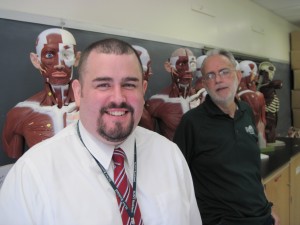RCC embraces the sciences

When a million dollars can buy just a single home or one season from a .250-hitting infielder, Rockland Community College is leveraging that amount to stake a claim in something much bigger: a science-driven future.
Two new labs will open when students return Sept. 1 and a third is being upgraded, also to be ready for the school year.
In 2008, the college offered 130 science sections, many with lab studies; today the number is 200. Science student numbers have spiked 40 percent and demand is such that classes now meet seven days a week.
New physics and chemistry laboratories are receiving their final touches. A third lab ”“ for general biology ”“ is seeing its intensely wired ceiling remade. All are in the Academic 1 building on the campus quad in Suffern.
The push into the sciences has been an evolution, according to Professor Bill Baker, who also is the college”™s former vice president. He said several previous science classrooms were trailers: “They dressed them up with brick so they would not look like trailers, but they were trailers,” he said. “The last one was removed last year. The library used to be in a double-wide.”
Grants are especially critical to the sciences, according to Kristopher Baker, chairman of the college”™s Division of Math, Natural and Health Sciences and also Bill Baker”™s son and himself a doctoral scientist, who said, “Without grants we can”™t afford the infrared spectrometers or gas chromatographs ”“ we just can”™t afford these things.” His department currently educates, in his words, “Thousands. Thousands.”
Bill Baker used the words “small and antiquated” to describe the campus when he arrived 42 years ago. “Sprawling and modern” are his adjectives of the moment.
When Bill Baker began teaching in 1970, the big science push was in prechiropractic studies ”“ since steamrolled to asterisk status by nursing interest ”“ and there was not a single ecology-themed course. His son”™s department, in contrast, offers green-tech studies, occupational therapy and EMS paramedic studies, linking with neighboring community colleges for a unified and uniform emergency medical studies.
As the 2011-12 school year dawns, Bill Baker now calls the RCC science offerings “as good a basic science education as you can get anywhere. You can take it anywhere and the credits will be accepted ”“ and save a ton of money.”
Baker and his wife, now deceased, produced three RCC alumni. “My three children had no choice. When they were getting their pabulum in their high chairs, the mantra was, ”˜When you get your degree from RCC you can go wherever you want.”™”
After earning 91 credits at RCC, Kristopher Baker received his undergraduate and master”™s degrees at RPI in Troy and his Ph.D. in coastal studies from SUNY Stony Brook. Kristopher”™s brother, Justin, also studied science at RCC, followed by a degree from SUNY Albany. “He”™s following his passion, which is working on cars,” Bill Baker said. And Kristopher”™s sister, Elizabeth, is now enduring clinical rotations as a fourth-year student at The Ohio State University School of Veterinary Medicine.
Besides improvements to Academic 1, the college in September 2006 debuted its 100,000-square-foot Technology Center, a chip shot from Academic 1 and the county”™s first green-certified building.
“We”™ve come a long way and we”™ve moved even faster with (college President) Cliff Wood, who points us in the right direction to get grants, which are very hard to get nowadays,” Bill Baker said. “He”™s helped us hugely with the renovations of the science labs and everything else on campus.”
In all sciences, Baker confirmed what many have come to know: The post-high school world of two- and four-year degrees that once garnered good jobs is fading. “Today”™s master”™s degree is yesterday”™s baccalaureate.”
One RCC student began his plans to feed the world with giant clams in the RCC labs and has now found a reception for his idea in larger academic halls. “He wants to feed the world,” Bill Baker said.
More than 11,000 students are enrolled in credit and noncredit courses at RCC.
The chemistry lab price tag is $700,000, a sum reached with the help of a grant secured by U.S. Rep. Elliot Engel, whose district includes part of Rockland County. The physics lab without the sinks and Bunsen burners of a chem lab has fewer needs, keeping the cost at $300,000.
“Chemistry labs suffer more wear and tear,” said Kristopher Baker. Flying projectiles are a fact of life in physics, however, so all computer screens have their own protective boxes.
Both labs feature 30-inch-high desks for both students and instructors ”“ 36 was the old norm, inaccessible to wheelchairs ”“ and web-wired White Boards that will replace blackboards.
In addition to engineering and health sciences, RCC offers courses in environmental science, general biology, anatomy and physiology and microbiology. Blood and parasite studies (hematology and parasitology) have fallen from the course offerings ”“ a factor of demand ”“ but the microbiology lab with its many safeguards could accommodate either regimen should it resurface.
The “envi sci” rubric has grown from Bill Baker”™s initial 1971 class to the current offerings in green buildings and green environmental practices. “A lot of our students go on to the SUNY forestry school at Syracuse.”
For those who seek what the college does not offer ”“ like the student with the giant clams ”“ there is independent study. There is also an honors program, wedding the humanities and the sciences; it”™s been known to reap Ivy League results.
Kristopher Baker said his department does not wait for course demand, but anticipates it. “We add 20 sections and they fill,” he said. “And we”™ve still had to add sections as we go. Things have been very good here in sciences, anything in science, technology, engineering and math, known as STEM.”
“It”™s a great education and you will save money for what really matters, the final two years of college and the push into graduate school,” Bill Baker said.